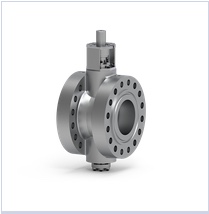29-11-2019
R&D activities in refining technologies presented to the Gazprom Neft board
Gazprom Neft’s strategic objective to 2030 is to become the benchmark in safety, efficiency and technological advancement for other companies worldwide. The company’s strategy outlines key performance indicators in oil refining, achieving which will allow the company to further consolidate its position as one of the industry’s technological leaders. Such KPIs include achieving a conversion rate of at least 95 percent, a light product yield of at least 80 percent, and a market share in the Russian catalysts market of 70 percent. To that end the company is implementing an oil-refining R&D programme focussed on two key areas: developing catalyst production technologies; and developing technologies in refining and petrochemicals.
Gazprom Neft currently holds 115 patents for developments in oil refining, petrochemicals and catalyst production, 45 of which are already in production, with the remaining solutions being prepared for commercial implementation. Work on creating and developing such technologies is being undertaken in partnership with leading scientific organisations in Russia, including the Boreskov Institute of Catalysis (a member of the Siberian Branch of the Russian Academy of Sciences (SB RAS), the Boreskov Institute’s New Federal Research Centre, the St Petersburg State Institute of Technology, Samara Polytech, and others.
One outcome of Gazprom Neft’s catalyst-production R&D programme has been a range of unique oil refining catalysts for producing high-tech motor fuels being brought into production. Gazprom Neft’s high-efficiency cat-cracking catalysts have been shown to outperform imported alternatives. An oligomerization catalyst developed by the company has been successfully put into operation at its Moscow Refinery, increasing the oligomerizate (an automotive fuel component) yield by 30 percent, and increasing catalyst regeneration runs 2.5-fold. The company has also introduced an innovative technology for reactivating diesel fuel hydrotreatment catalysts, with 100-percent regeneration of spent diesel-fuel hydrotreatment catalysts being confirmed at the Omsk Refinery.
A significant part of Gazprom Neft’s R&D programme also includes projects on developing (and improving efficiency in) oil refining and petrochemicals technologies, with the company successfully bench-testing the “aeroforming” process — the processing of low-octane fractions into a high-octane gasoline component — in 2019. Processing of source data on designing an aeroforming facility, and the economic viability of this being integrated into company assets, is currently ongoing. Gazprom Neft is continuing its implementation of a project to develop domestic needle coke technology — a product used in manufacturing ultra-reliable graphite electrodes, used in the metallurgy industry. The company is also actively working on developing processes to facilitate the processing of heavy raw materials — such as tar, asphalt or pyrolysis resins — into high-quality marine fuels meeting MARPOL 2020 standards, or raw materials for hydrocracking and cat-cracking facilities.
Gazprom Neft now has in place an effective system for creating and utilising practical solutions directed at developing catalytic systems and refining technologies, and expanding the company’s product range. The company will continue ongoing work on patenting new, high-efficiency products and technologies, and developing subsequent commercial applications for these.
News Category:
-
MAIRE announces major contract wins
MAIRE announces that its subsidiaries TECNIMONT and KT-Kinetics Technology, also thanks to the technological and engineering services provided by NEXTCHEM, have been ...
29-04-2025
-
Borouge to boost production capacity
Borouge Plc, a leading petrochemicals company that provides innovative and differentiated polyolefins solutions, has today announced a series of strategic asset expansion ...
28-04-2025
-
Wanhua Chemical signs JV agreement with Petrochemical Industries Company
On April 25, Wanhua Chemical formally signed a joint venture agreement with Petrochemical Industries Company. Under the terms of the agreement, PIC invested USD ...
27-04-2025
-
TotalEnergies to cease operating its oldest steam cracker in Antwerp
TotalEnergies’ Antwerp platform provides an update on its investments for the future and announces plan to reconfigure its petrochemicals operations to strengthen competitiveness. ...
23-04-2025
-
HOERBIGER to break ground on new Florida Campus in Florida
HOERBIGER Corporation of America will hold a ceremony to commemorate the groundbreaking of its future home, the HOERBIGER Florida Campus, on Wednesday, April 23rd. Construction ...
22-04-2025
-
Amogy and JGC to accelerate commercialisation of ammonia cracking catalyst
Amogy, a provider of mature, scalable, and efficient ammonia-to-power solutions, today announced the first pilot plant deployment of its advanced ammonia cracking catalyst ...
17-04-2025
-
Clariant teams up with Technip to introduce new steam-to-oil catalyst
Clariant, a global leader in specialty chemicals, today announced the launch of StyroMax UL-100, its most advanced ethylbenzene dehydrogenation catalyst to date. This ...
09-04-2025
-
Yokogawa Launches OpreX Plant Stewardship
Yokogawa Electric Corporation announces the launch today of OpreXTM Plant Stewardship, the most comprehensive lifecycle service program in the company’s OpreX Sustainable ...
08-04-2025
-
IndianOil to build mega petrochemical project in Paradip
In a landmark development, Indian Oil Corporation Ltd. (IndianOil) signed a Memorandum of Understanding (MoU) with the Government of Odisha to set up a world-class Petrochemical ...
08-04-2025
-
BDI BioEnergy to begin construction of biofuel feedstock refinery plant
BDI-BioEnergy International has signed a contract with Ghent Renewables BV to begin the construction of a pioneering biofuel feedstock refinery plant. This facility will ...
04-04-2025

















